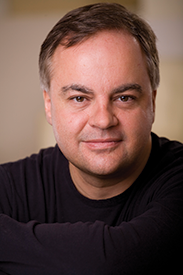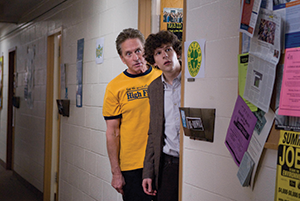Hollywood insider
Kevin Kasha ’83 has been a key player in the entertainment industry for more than two decades.


Kevin Kasha loves Steve McQueen. He owns a replica of the King of Cool’s Ford Mustang from Bullitt, also the name of Kasha’s fantasy football team. The film’s legendary car chase is the best of all time, according to Kasha, because of its “purity. The characters were the cars.” (A reporter’s nomination for The French Connection is politely shot down.) The poster for the 1968 classic adorns a wall in his office, which is home to other inspirational trinkets and paraphernalia that brand Kasha as a movie lover, one who got hooked thanks to afternoon flicks on the tube and Friday night jaunts to the Forum Theatre.
In that same office, Kasha serves as the executive vice president for worldwide acquisitions and co-productions at Anchor Bay Films. “We’re looking at scripts, screeners, screening films, meeting with filmmakers, meeting with potential investors,” says Kasha, a 1983 business graduate who also had successful executive stints at New Line Home Entertainment and Miramax Films. “It covers everything from executive producing a film to actually screening a completed film and figuring out the right price to pay for it.”
Sometimes the passion and professionalism come together. Kasha is working with Neile McQueen-Toffel, the movie star’s first wife, on developing her memoir, Steve McQueen: My Husband, My Friend, for the screen.
From film buff to studio exec
Growing up in Woodbridge, New Jersey, Kasha was into movies, but “not the way everyone else was,” remembers longtime friend Joe Russo. Kasha could recite the biographies of actors who were mostly only recognized by their agents or family members. Russo once asked Kasha what possessed him to retain such information. The response: “They’re stars, too.” The family loved movies, says Kasha’s sister, Eileen Plesnarski ’78, but he “brought it beyond the word ‘hobby.’” Plesnarski says Kasha had a knack for retaining facts about anything that interested him. “He’s Mr. Trivia,” jokes Plesnarski.
Even at New Line Home Entertainment, he stood out. Kasha’s office nickname was “Video Rain Man,” a nod to Dustin Hoffman’s classic phonebook-memorizing savant. “He had an internal database of information about films and stars and B-actors and C-actors that other people just didn’t have,” says Stephen Einhorn, formerly the company’s president and chief operating officer.

Underneath the encyclopedic knowledge of character actors lay a keen understanding of what made a movie successful. “Someone would say [a movie title] and Kevin would say, ‘It wasn’t sold that way, and it didn’t perform this way, and these were the elements that made it work, and these were the elements that weren’t successful,’” Einhorn says. “He could bring to bear a huge amount of information. These were in meetings. People learned there wasn’t much point in disputing him, because he was always right.”
Thanks to Einhorn’s tutelage, Kasha—whose big-time industry experience started in sales, distribution, and marketing at the late Vestron, which introduced Dirty Dancing to the world—learned how movies got made. “When you’re in acquisitions, you’re essentially production anyway, because you’re pre-buying films,” Einhorn explains, “and you have to pick up the process: scripts, budgets, expense categories, what the delivery schedules are, the clearances are. You need to know that, just the way any producer does. And Kevin does.”
Kasha, 50, joined Anchor Bay Films in 2008. “I like the independent film world,” he says. “You’re responsible for everything from start to finish.” He acquired 2009’s art house, character-driven hits Solitary Man and City Island, which were also dark horse Oscar contenders. He also spearheaded Anchor Bay’s video distribution deals with The Weinstein Company—founded by Kasha’s former Miramax bosses, Bob and Harvey Weinstein—and the Ultimate Fighting Championship (UFC). The Winstein Company is responsible for theatrical hits ranging from The Reader to The King’s Speech, while the UFC continues to chip away at boxing’s relevancy.
In acquiring movies, Kasha says a project has to make “economic sense.” Liking something isn’t enough. “You’d be amazed how many people will make a movie or will be involved in a movie, and you ask them, ‘Who’s the audience for it?’ and they don’t know,” Kasha says. “That’s a bad formula.” That scenario doesn’t mean a dead end. “He’s always on the side of the filmmaker,” Einhorn says. “He’ll always do the right thing”—including recommending other places where the film could get made. “He’s just a genuine person who loves movies and wants to help filmmakers get their films made,” says colleague Michele Sanchez, who has worked with Kasha for about six years.
 “I don’t know why anyone would be in this business if you don’t love movies,” says Kasha, who makes no attempt to hide it. (Remember the office?) “I take my responsibilities very seriously. I don’t take myself very seriously.” Sue Procko, whose firm SPPR handles public relations for Anchor Bay Films, compares Kasha to “a kid at a candy store at film festivals.” At this year’s Sundance Film Festival, he got into good-natured disagreements with film critics. “He loves being around people,” she adds.
“I don’t know why anyone would be in this business if you don’t love movies,” says Kasha, who makes no attempt to hide it. (Remember the office?) “I take my responsibilities very seriously. I don’t take myself very seriously.” Sue Procko, whose firm SPPR handles public relations for Anchor Bay Films, compares Kasha to “a kid at a candy store at film festivals.” At this year’s Sundance Film Festival, he got into good-natured disagreements with film critics. “He loves being around people,” she adds.
According to Procko, a 23-year Hollywood PR veteran, Kasha is one of “probably 20 people in the industry that I’ve come across that have that kind of passion. He knows films; he seems to get a kick out of his job. It’s infectious when you’re around [him].”
Coolest job ever
Kasha laughs when asked if he has the coolest job among his friends and family members. “Maybe,” he says.
He’s quick to note that the film industry is like any other business. “You deal with people who have strong opinions and egos, but you’re dealing with people who are very passionate about their project. I respect that,” he says. “Not every movie is going to be my cup of tea, but I see if there’s a business opportunity with the movie. It may not be my kind of movie, but if there’s a chance for the movie to be successful for the company or the filmmakers, you support that.
“Once in a while,” he adds, “I’ll catch myself going, ‘Oh, Andy Garcia [the star of City Island] just said, ‘Let’s grab a drink, Kev.’ The nice thing is a lot of times you look up at the screen and [the actors] are larger than life and they’re heroes to you, but when you sit down you realize, ‘They have families. They have issues. They’re just regular people.’ That’s one of the nicer parts of the job.”
Among the subjects discussed over drinks? Steve McQueen, of course.
Posted on June 6, 2011


